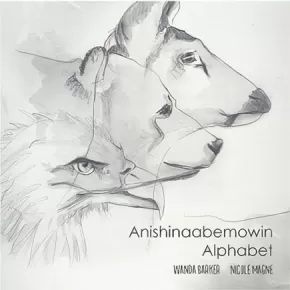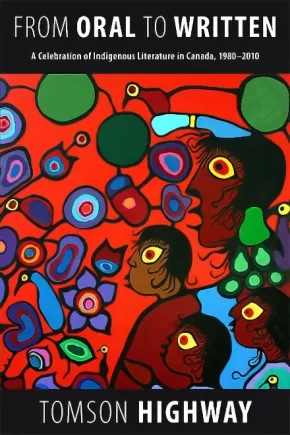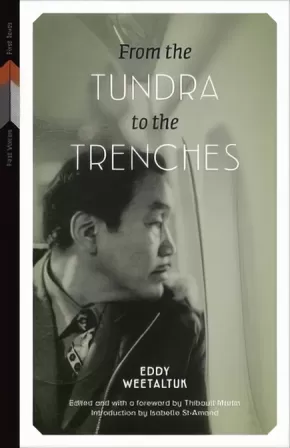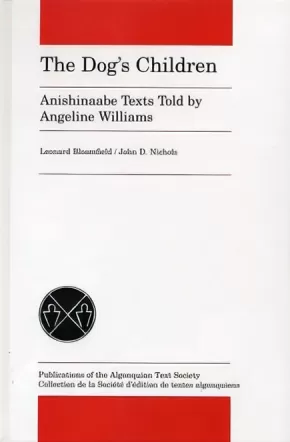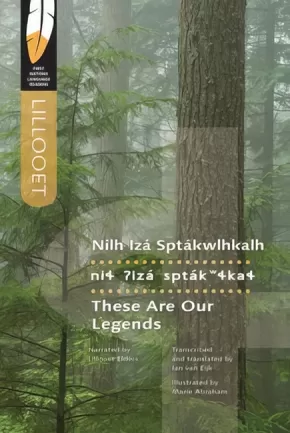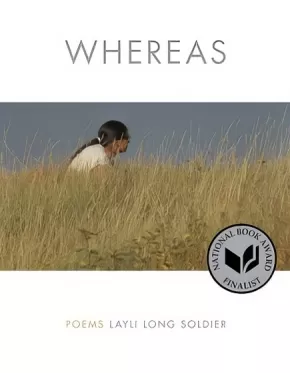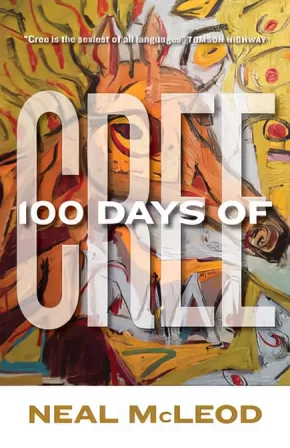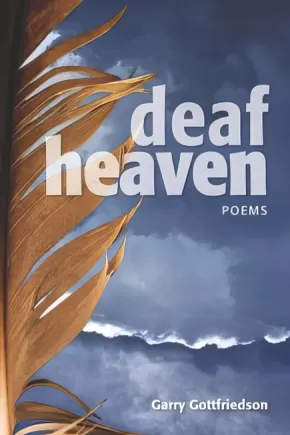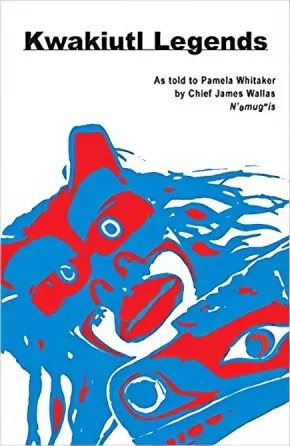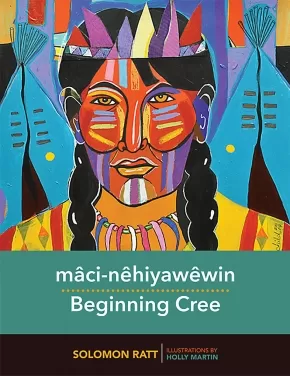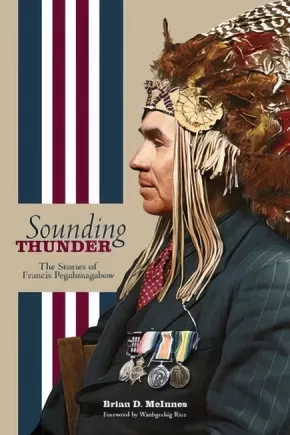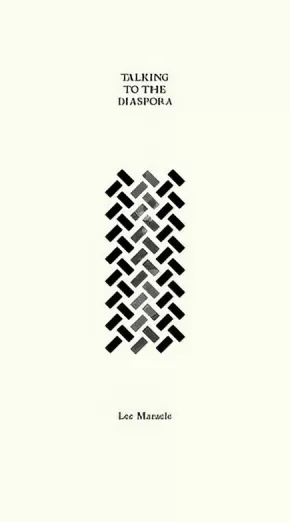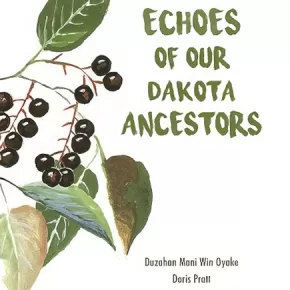
Language
91
-
105
of
123 Results;
Sort By
Go To
of 9
Anishinaabemowin Alphabet
$10.00
Artists:
Format:
Paperback
Text Content Territories:
Indigenous Canadian; First Nations; Anishinaabeg; Ojibway;
Reading Level: N/A
ISBN / Barcode: 9781927849354
Synopsis:
Synopsis:
It’s never too early to start teaching children their First Nations language, and Anishinaabemowin Alphabet is the perfect place to begin. This book is filled with beautifully shaded illustrations, Anishinaabemowin/Ojibwe words and their English translations, and it can be used by students, parents and teachers young and old. It is written in the double vowel writing system and is intended to show the sequence of the Ojibwe alphabet. The images can serve as a starting point for discussion of the cultural relevancy of the word associated with each letter.
Educator Information
This book is written in the Ojibwe language. An English translation for each word is provided at the back of the book.
The publisher recommends this book for children or anyone learning the Ojibwe language.
From Oral to Written: A Celebration of Indigenous Literature in Canada, 1980-2010
$35.00
Format:
Paperback
Text Content Territories:
Indigenous Canadian;
ISBN / Barcode: 9781772011166
Synopsis:
Synopsis:
Aboriginal Canadians tell their own stories, about their own people, in their own voice, from their own perspective.
If as recently as forty years ago there was no recognizable body of work by Canadian writers, as recently as thirty years ago there was no Native literature in this country. Perhaps a few books had made a dent on the national consciousness: The Unjust Society by Harold Cardinal, Halfbreed by Maria Campbell, and the poetry of Pauline Johnson and even Louis Riel. Now, three decades later, Native people have a literature that paints them in colours that are psychologically complex and sophisticated. They have a literature that validates their existence, that gives them dignity, that tells them that they and their culture, their ideas, their languages, are important if not downright essential to the long-term survival of the planet.
Tomson Highway’s From Oral to Written is a study of Native literature published in Canada between 1980 and 2010, a catalogue of amazing books that sparked the embers of a dormant voice. In the early 1980s, that voice rose up to overcome the major obstacle Native people have as writers: they are not able to write in their own Native languages, but have to write in the languages of the colonizer, languages that simply cannot capture the magic of Native mythology, the wild insanity of Trickster thinking. From Oral to Written is the story of the Native literary tradition, written – in multiple Aboriginal languages, in French, and in English – by a brave, committed, hard-working, and inspired community of exceptional individuals – from the Haida Nation on Haida Gwaii to the Mi’kmaq of Nova Scotia’s Cape Breton Island.
Leading Aboriginal author Tomson Highway surveys the first wave of Native writers published in Canada, highlighting the most gifted authors and the best stories they have told, offering non-Native readers access to reconciliation and understanding, and at the same time engendering among Native readers pride in a stellar body of work.
Reviews
“We gratefully acknowledge the work of those artists who have come before, and those that continue, building bridges across our cultures through their authentic words. Tomson Highway’s readings each demonstrate that within our stories, we pass along our teachings and we build upon the strength inside each one of us. We are arriving. Back to our lands, back to our stories, back to our truths, unwrapping old words and sharing wisdom. We, are coming home.” —Terri Mack, Strong Nations
“A rich compilation of Indigenous literature that will be a gift for Canadian school curriculums, also well suited for those Canadians in search of understanding and reconciliation. More importantly this book is what Indigenous people need because, like me, they will discover their lives in the many stories. If I had this as a teenager, I would have understood that I was not alone in the darkness I lived. I would have seen that others found a way out. Bravo, Tomson Highway!” ―Bev Sellars, author of They Called Me Number One: Secrets and Survival at an Indian Residential School and Price Paid: The Fight for First Nations Survival
Educator Information
Recommended in the Canadian Indigenous Books for Schools 2019-2020 resource list as a Teacher Resource.
Additional Information
|
From the Tundra to the Trenches
$24.95
Editors:
Format:
Paperback
Text Content Territories:
Indigenous Canadian; Inuit;
ISBN / Barcode: 9780887558221
Synopsis:
Synopsis:
“My name is Weetaltuk; Eddy Weetaltuk. My Eskimo tag name is E9-422.” So begins From the "Tundra to the Trenches." Weetaltuk means “innocent eyes” in Inuktitut, but to the Canadian government, he was known as E9-422: E for Eskimo, 9 for his community, 422 to identify Eddy.
In 1951, Eddy decided to leave James Bay. Because Inuit weren’t allowed to leave the North, he changed his name and used this new identity to enlist in the Canadian Forces: Edward Weetaltuk, E9-422, became Eddy Vital, SC-17515, and headed off to fight in the Korean War. In 1967, after fifteen years in the Canadian Forces, Eddy returned home. He worked with Inuit youth struggling with drug and alcohol addiction, and, in 1974, started writing his life’s story. This compelling memoir traces an Inuk’s experiences of world travel and military service. Looking back on his life, Weetaltuk wanted to show young Inuit that they can do and be what they choose.
Reviews
“Endlessly interesting; an account of a traditional way of life now lost, a gripping first-hand account of a front-line soldier during the war, and an honest account of a young man’s adventures and misadventures. It is to all our benefit that it has, at last, found its way into print." — Michael Melgaard, The National Post
“Tender, honest, and often raw, Weetaltuk’s storytelling is masterful, engrossing, and deeply human. He has imbued his writing with a philosophical nuance that is characteristically Inuit: very subtle, yet profound." — Siku Allooloo, The Malahat Review
“Recounts the adventures of Inuk veteran Eddy Weetaltuk, from his early life in the North to his escape to the south under an assumed identity, to his enlistment in the Canadian Forces, which took him across the Canadian West, to Japan and Germany, and into battle in Korea. Adopting the name Eddy Vital was necessary in 1951 because the federal government restricted the movement of Inuit people. Through his alias, Weetaltuk was able to see the world; in the army, he experienced equality and respect – all the while never forgetting his true identity as an Inuk. The publication history of From the Tundra to the Trenches is itself a four-decades-long saga of many twists and turns. That it now finds English publication (after first appearing in French and German) owes to the author’s conviction that his life story be read as a work of literature with the makings of a bestseller. Eddy Weetaltuk was right.”— Jade Colbert, The Globe and Mail
“For those interested in Inuit culture it offers the rare and valuable perspective of an Inuk looking out from his culture at the world rather than the world looking in. “ — P. T. Sherrill, CHOICE
Educator & Series Information
From the Tundra to the Trenches is the fourth book in the First Voices, First Texts series, which publishes lost or underappreciated texts by Indigenous writers. This new English edition of Eddy Weetaltuk’s memoir includes a foreword and appendix by Thibault Martin and an introduction by Isabelle St-Amand.
Additional Information
280 pages | 5.50" x 8.50" | 25 colour illustrations, 3 b&w photographs, bibliography
Read, Listen, Tell: Indigenous Stories from Turtle Island
$41.99
Editors:
Format:
Paperback
Text Content Territories:
Indigenous Canadian;
ISBN / Barcode: 9781771123006
Synopsis:
Synopsis:
Read, Listen, Tell brings together an extraordinary range of Indigenous stories from across Turtle Island (North America). From short fiction to as-told-to narratives, from illustrated stories to personal essays, these stories celebrate the strength of heritage and the liveliness of innovation. Ranging in tone from humorous to defiant to triumphant, the stories explore core concepts in Indigenous literary expression, such as the relations between land, language, and community, the variety of narrative forms, and the continuities between oral and written forms of expression. Rich in insight and bold in execution, the stories proclaim the diversity, vitality, and depth of Indigenous writing.
Building on two decades of scholarly work to centre Indigenous knowledges and perspectives, the book transforms literary method while respecting and honouring Indigenous histories and peoples of these lands. It includes stories by acclaimed writers like Thomas King, Sherman Alexie, Paula Gunn Allen, and Eden Robinson, a new generation of emergent writers, and writers and storytellers who have often been excluded from the canon, such as French- and Spanish-language Indigenous authors, Indigenous authors from Mexico, Chicana/o authors, Indigenous-language authors, works in translation, and "lost" or underappreciated texts.
In a place and time when Indigenous people often have to contend with representations that marginalize or devalue their intellectual and cultural heritage, this collection is a testament to Indigenous resilience and creativity. It shows that the ways in which we read, listen, and tell play key roles in how we establish relationships with one another, and how we might share knowledges across cultures, languages, and social spaces.
Reviews
Edited by experts in Indigenous literature and contextualised beautifully, historical writers like E. Pauline Johnson are placed alongside exciting genres like Indigenous Science Fiction — illustrating the vibrancy and innovation of Indigenous storytelling across time, space and politics. If you want a primer on Indigenous cultural expressions, this is for you. If you want deft, detailed stories in Indigenous written, oral and graphic traditions, these will expand your thinking. Read, Listen, Tell will make you laugh, dream and search for more. — Niigaanwewidam Sinclair
A unique compendium that is the direct result of outstanding and painstaking scholarship, Read, Listen, Tell: Indigenous Stories from Turtle Island is an impressively informative, deftly organized, and exceptionally well presented volume that is unreservedly recommended for both community and academic library Indigenous Cultural Studies collections and supplemental reading lists. — Midwest Book Review
Read, Listen, Tell collects a brilliant and vast array of indigenous short fiction, bolstered by insightful critical essays that prioritize indigenous voices, culture, and methodologies. — Clarissa Goldsmith, Foreword Reviews, July 2017
Educator Information
• Connects Indigenous writing across colonial settler borders (of Canada, USA, and Mexico) at a time when those borders are hardening in light of security measures.
• Truth and Reconciliation Commission report highlights focus on education, prioritizing Indigenous knowledges, pedagogies, and perspectives—this book provides that.
• Provides curriculum material for new Indigenous content mandates in some provinces (Ontario, BC).
• Includes French-, Spanish-, and Indigenous-language.
• Indigenous authors (in translation).
Additional Information
410 pages | 6.00" x 9.00"
Edited by Sophie McCall, Deanna Reder, David Gaertner, and Gabrielle L'Hirondelle Hill
The Dog’s Children: Anishinaabe Texts told by Angeline Williams
$32.95
Editors:
Format:
Paperback
Text Content Territories:
Indigenous American; Native American; Anishinaabeg; Ojibwe (Chippewa);
Grade Levels: University/College;
ISBN / Barcode: 9780887558337
Synopsis:
Synopsis:
In 1941, Angeline Williams, an Anishinaabe elder left her home on an island in the St. Mary’s River between Michigan and Ontario and travelled south to North Caroline to teach the Ojibwe (Chippewa) language. At the Linguistic Institute, a summer school of linguistics, Angeline Williams spoke words and sentences and told anecdotes and stories to give the students practice in transcribing an analyzing the structure of an unwritten language.
The Dog’s Children includes twenty stories dictated to the class and the teaching staff, Charles F. Voegelin, and Leonard Bloomfield, as later edited by Bloomfield. The manuscript from which this edition has been prepared is now at the National Anthropological Archives at the Smithsonian Institution. Presented in Ojibwe, with English translations by Bloomfield. The volume also contains an Ojibwe-English glossary and other linguistic study aids.
Reviews
"This book is tremendously valuable as a tool for understanding not only linguistic research but for understanding the life and culture of an Ojibwe woman. Angeline Williams, Biidaasigekwe or "Sunlight Woman," came to Virginia in 1941 from Sugar Island on the St. Mary's River to teach the Ojibwe language to Leonard Bloomfield. Bloomfield's subsequent translations and understanding of the Algonquian language family led to significant advances and changes in the study of linguistics. This series of Ojibwe stories and their up-to-date translations to English illustrate the thoroughness of Bloomfield's linguistic research.... The Ojibwe word inaajimowin means "story" in English. Throughout this book, Angeline Williams weaves Ojibwe "stories" that are influenced by myth, regionality, and family. The oral quality of her stories is rich in meaning and humor. More important these stories remain as an ethnographic record of her life and her contributions tofurther cultural understanding of the Ojibwe people. The updated version of Bloomfield's notes and the orthography installed by Nichols serves to enhance the fine translations and culturally rich Ojibwe stories. The notes on inflectional endings and the glossary with a dictionary of Ojibwe-to-English and English-to-Ojibwe translations make the book even more valuable as a linguistic resource tool. The mirror-like lay-out of the book also aids in understanding the translations. With alternating pages of Ojibwe and English, it is easy to compare the translations paragraph by paragraph, even line by line." - Paul C. Brooke, Department of English, Iowa State University
Additional Information
268 pages | 6.00" x 9.00"
These Are Our Legends
$24.95
Format:
Paperback
Text Content Territories:
Indigenous Canadian; First Nations; Salish; Interior Salish; St'at'imc (Lillooet, Lil'Wat);
Grade Levels: 12; University/College;
ISBN / Barcode: 9780889773967
Synopsis:
Synopsis:
Like all First Nations languages, Lillooet (Lil'wat) is a repository for an abundantly rich oral literature. In These Are Our Legends, the fifth volume of the First Nations Language Readers series, the reader will discover seven traditional Lillooet sptakwlh (variously translated into English as "legends," "myths," or "bed-time stories.")
These texts are presented in a technical transcription that can be used by linguists, and also in a practical orthography that can be used by Lillooet speakers themselves. An English translation is also given. Basic information on the Lillooet language, its grammar, and a glossary are included in the volume.
With thanks to the Mount Currie Cultural Centre and the Tszil Publishing House.
Series Information
These Are Our Legends is part of the First Nations Language Readers series. With a mix of traditional and new stories, each First Nations Language Reader introduces an Indigenous language and demonstrates how each language is used today. The University of Regina Press’s long-term goal is to publish all 60+ Indigenous languages of Canada.
Additional Information
120 pages | 5.50" x 8.50" | Narrated by Lillooet Elders | Transcribed and Translated by Jan van Eijk
Authenticity Note: This book has been labelled as containing Authentic Indigenous Text because of the narration from Lillooet Elders. It is up to readers to determine if this text will work as an authentic resource for their purposes.
Whereas: Poems
$22.99
Format:
Paperback
Text Content Territories:
Indigenous American; Native American; Sioux; Lakota;
Grade Levels: 12; University/College;
ISBN / Barcode: 9781555977672
Synopsis:
Synopsis:
WHEREAS her birth signaled the responsibility as mother to teach what it is to be Lakota therein the question: What did I know about being Lakota? Signaled panic, blood rush my embarrassment. What did I know of our language but pieces? Would I teach her to be pieces? Until a friend comforted, Don’t worry, you and your daughter will learn together. Today she stood sunlight on her shoulders lean and straight to share a song in Diné, her father’s language. To sing she motions simultaneously with her hands; I watch her be in multiple musics. —from “WHEREAS Statements”
WHEREAS confronts the coercive language of the United States government in its responses, treaties, and apologies to Native American peoples and tribes, and reflects that language in its officiousness and duplicity back on its perpetrators. Through a virtuosic array of short lyrics, prose poems, longer narrative sequences, resolutions, and disclaimers, Layli Long Soldier has created a brilliantly innovative text to examine histories, landscapes, her own writing, and her predicament inside national affiliations. “I am,” she writes, “a citizen of the United States and an enrolled member of the Oglala Sioux Tribe, meaning I am a citizen of the Oglala Lakota Nation—and in this dual citizenship I must work, I must eat, I must art, I must mother, I must friend, I must listen, I must observe, constantly I must live.” This strident, plaintive book introduces a major new voice in contemporary literature.
Additional Information
114 pages | 7.04" x 8.84"
100 Days of Cree
$24.95
Format:
Paperback
Text Content Territories:
Indigenous Canadian; First Nations; Cree (Nehiyawak);
ISBN / Barcode: 9780889774292
Synopsis:
Synopsis:
As an Elder once said, "Learn one Cree word a day for 100 days, and emerge a different person."
In 100 Days of Cree, Neal McLeod offers us a portal into another way of understanding the universe--and our place within it--while demonstrating why this funny, vibrant, and sometimes salacious language is "the sexiest of them all" (according to Tomson Highway).
Based on a series of Facebook posts, the 100 short chapters or "days" in the book present a chain of related words, some dealing with the traditional--the buffalo hunt, the seasons--and others cheekily capturing the detritus of modern life--from Internet slang to Johnny Cash songs to Viagra.
The result is both an introduction to the most widely spoken Indigenous language in Canada and the opportunity to see the world, and ourselves, in another way.
Reviews
"The nonfiction book is divided into 100 themes and offers Cree words and English explanations for everything from traditional subjects such as powwows and medicine to modern subjects such as Facebook and Star Wars. It also includes a guide to pronunciation written by Arok Wolvengrey, a linguist and the author of a Cree-English dictionary. 'When we think about indigenous languages, there’s a part of us that thinks they’re dying languages, ' URP publisher Bruce Walsh said. 'And then this manuscript comes in that demonstrates a living, vital language.' McLeod said that he and Wolvengrey worked to keep a balance between traditional usage and modern adaptations. 'To revitalize our languages, we have to do two things: we have to document the classical terminology, because within that terminology are all of our metaphors and idioms; but we also have to think of how to put old words together, to coin words, to describe the contemporary world.'" — Laura Godfrey, Publishers Weekly
Additional Information
325 pages | 5.50" x 7.00"
Deaf Heaven
$15.95
Format:
Paperback
Text Content Territories:
Indigenous Canadian; First Nations; Salish; Interior Salish; Secwepemc (Shuswap);
Grade Levels: 12; University/College;
ISBN / Barcode: 9781553804499
Synopsis:
Synopsis:
Poetry that takes us inside present-day First Nations reality to reveal the wounds of history and the possible healing to come.
As the title suggests, this new collection of poetry from Garry Gottfriedson of the Secwepemc (Shuswap) Nation deals with the ways in which the world is deaf to the problems First Nations people face in Canada today.
Follow Garry Gottfriedson in this new collection of combative poems as he compels us and Heaven to listen to the challenges facing First Nation communities today. Employing many of the Secwepemc (Shuswap) images and stories, Gottfriedson takes us inside the rez and into the rooming houses in the city cores, but always drawing new strength from the land and the people who have moved upon it. He speaks of “the smell of grandmothers and grandfathers / breathing the stories into our blood” so as to “wrap our newborn in freshly made Star Quilts.”
Gottfriedson examines such issues as the Truth and Reconciliation movements as well as the missing and murdered Aboriginal women. The poems focus not only on postcolonial issues but also on First Nations internal problems. Although the book speaks of age-old themes, it explores them through fresh modern eyes offering thought-provoking and engaging prespectives. Eloquent and witty, these poems are power-packed with imagery that uncovers the raw politics of race. There is nothing polite about them. While frequently offering a bleak view of present-day First Nation conditions, the poems also provide a sense of optimism: "the hope/that the coldest day in winter/will promise serenity in spring."
Reviews
“Gottfriedson’s poetry is built to endure and it will remain with you long after this book is closed.” – Alexander MacLeod, author of Light Lifting, finalist for the Scotiabank Giller Prize
“Garry Gottfriedson rides double, calling out the violence and corruption he’s seen, while reminding us that grounded strength comes from staying connected to grandmothers, grandfathers, horses, and the land.” – Rita Wong, author of Forage, winner of the Dorothy Livesay Poetry Prize
“Gottfriedson writes us the sound of his blood, the splatter of ink on wood, and the dripping sweat and tears of prayer — all of it telling us who we are and chanting, as if in chorus, ‘survival is brilliant.’ Will we be wise or strong enough to listen?” – Shane Rhodes, author of X: Poems & Anti-Poems
Educator Information
This book of poetry would be useful for Indigenous Studies courses or literature courses such as Indigenous Literatures, Canadian Literature, and Creative Writing.
Additional Information
100 pages | 6.00" x 9.00"
Kwakiutl Legends: As Told to Pamela Whitaker by Chief James Wallas
$16.95
Format:
Paperback
Text Content Territories:
Indigenous Canadian; First Nations; Kwakwaka'wakw (Kwakiutl);
ISBN / Barcode: 9780888392305
Synopsis:
Synopsis:
The stories in this book relate the traditional tales which Mr. James Wallas has learned from his elders, who lived in Quatsino Sound and on Hope Island. Mr. Wallas's forefathers are members of a people known generally as the Kwakiutl, although the term is misleading because it originally referred to a sub-group living at Fort Rupert. The Kwakiutl inhabit an area which at present includes Campbell River at the southern extreme, Quatsino Sound at the western extreme, various inlets of mainland B.C. at the eastern extreme, and Smiths Inlet at the northern extreme. Traditionally, the Kwakiutl lived in villages located in this general area (excluding Campbell River an Cape Mudge) which were organized into tribes. Today, most of them live on reserves near towns, maintaining some remote villages for food preparation and preserving during the spring, summer and fall.
Additional Information
216 pages | 5.50" x 8.50" | 11 Colour Line Drawings
mâci-nêhiyawêwin: Beginning Cree
$34.95
Artists:
Format:
Coil Bound
Text Content Territories:
Indigenous Canadian; First Nations; Cree (Nehiyawak);
ISBN / Barcode: 9780889774353
Synopsis:
Synopsis:
Designed as an introduction for Cree language learners, Beginning Cree acts as a self-study aid--a much-needed resource in today's world where most students cannot speak Cree fluently. Basic grammar units and everyday vocabulary items guide the student through the building blocks of the language, and expansion drills and exercises reinforce lessons and prepare the student for further study. With over 100 delightful illustrations, Beginning Cree grounds the language in traditional and contemporary contexts.
Educator & Series Information
This book is recommended for ages 12+.
Table of Contents
Chapter One: Introduction
Chapter Two: Nouns
Chapter Three: Prepositions and Pronouns
Chapter Four: Animate Intransitive Verbs
Chapter Five: Inanimate Intransitive Verbs
Chapter Six: Possessives: Kinship Terms
Chapter Seven: Transitive Inanimate Verbs
Chapter Eight: Transitive Animate Verbs
Verb Charts
Conjugation Patterns
Vocabulary List
Bibliography
Notes
The Canadian Indigenous Books for School list recommends this resource for Grades 1-12 for these subject areas: Indigenous Language Studies, Language Studies.
Part of the Indigenous Languages for Beginners series.
The book is specifically geared towards learners of the Plains Cree "Y" dialect, also known as the "Y" dialect.
Additional Information
165 pages | 8.50" x 11.00" | black and white illustrations | spiral bound
Sounding Thunder: The Stories of Francis Pegahmagabow
$24.95
Format:
Paperback
Text Content Territories:
Indigenous Canadian; First Nations; Anishinaabeg; Ojibway;
ISBN / Barcode: 9780887558245
Synopsis:
Synopsis:
Francis Pegahmagabow (1889–1952), a member of the Ojibwe nation, was born in Shawanaga, Ontario. Enlisting at the onset of the First World War, he became the most decorated Canadian Indigenous soldier for bravery and the most accomplished sniper in North American military history. After the war, Pegahmagabow settled in Wasauksing, Ontario. He served his community as both chief and councillor and belonged to the Brotherhood of Canadian Indians, an early national Indigenous political organization. Francis proudly served a term as Supreme Chief of the National Indian Government, retiring from office in 1950.
Francis Pegahmagabow’s stories describe many parts of his life and are characterized by classic Ojibwe narrative. They reveal aspects of Francis’s Anishinaabe life and worldview. Interceding chapters by Brian McInnes provide valuable cultural, spiritual, linguistic, and historic insights that give a greater context and application for Francis’s words and world. Presented in their original Ojibwe as well as in English translation, the stories also reveal a rich and evocative relationship to the lands and waters of Georgian Bay.
In Sounding Thunder, Brian McInnes provides new perspective on Pegahmagabow and his experience through a unique synthesis of Ojibwe oral history, historical record, and Pegahmagabow family stories.
Awards
- Fred Landon Award, Ontario Historical Society (2018)
- American Book Award, Before Columbus Foundation (2017)
Reviews
“Debwemigad Nimkiig gaye Aadizookanag zhawenimaawaad. Brian McInnes has clearly been blessed by the Thunders and Great Storytellers. With Sounding Thunder he has achieved the perfect balance of personal memoir and scholarly inquiry. He shares with readers the stories that have connected one generation to another and in these cycles we find the truth about living. Dibaajimowinan omaada’oozhinang mii igo aanikoobijige.” – Margaret Ann Noodin, Assistant Professor, Department of English, University of Wisconsin
“Debwemigad Nimkiig gaye Aadizookanag zhawenimaawaad. Brian McInnes has clearly been blessed by the Thunders and Great Storytellers. With Sounding Thunder he has achieved the perfect balance of personal memoir and scholarly inquiry. He shares with readers the stories that have connected one generation to another and in these cycles we find the truth about living. Dibaajimowinan omaada’oozhinang mii igo aanikoobijige.” – Margaret Ann Noodin, Assistant Professor, Department of English, University of Wisconsin
“This uniquely intimate portrait illuminates Francis’s commitment to live in a way that reflected the spiritual values of sharing and respect for life, despite his military record of 378 enemy kills for which he became renowned.” – Allyson Stevenson, University of Guelph, Canadian Journal of History
“McInnes’ Sounding Thunder brings complexity and nuance to the story (or stories) of Francis Pegahmagabow’s life. Past authors have portrayed Pegahmagabow alternatively as a warrior, a veteran, and/or a political activist. Certainly, these depictions capture snapshots of his character. But McInnes goes much further, adding breadth and depth to the sketch of the Nishnaabe man from Georgian Bay. He has produced a high-quality piece of historical research that tells an important story of Indigenous peoples as human beings with challenges that exist both within and without the constraints of colonialism.” – Eric Story, Laurier Centre for Military, Strategic and Disarmament Studies
“Sounding Thunder is invaluable for those working in biographical, historical, Indigenous, military and political studies and the general reader. McInnes skillfully contextualizes his subject as one of Canada’s greatest war heroes as well as a member of his family, community, and Anishinaabe people.” – Brock Pitawanakwat, Assistant Professor, Department of Indigenous Studies, University of Sudbury
“Brian McInnes’ book is both elegant and masterful in its weaving of language, spirituality, storytelling, family, community, and physical place on the lands and waters of Georgian Bay as he presents the world and life of his great-grandfather, Francis Pegahmagabow. McInnes’ presentation of family stories in both Ojibwe and English, and his placement of them within their historical and geographical context, underlines Waubgeshig Rice’s claim in his foreword to Sounding Thunder that the book will remain ‘a vital resource for generations to come.’” – Jurors, Fred Landon Award, Ontario Historical Society
Educator Information
This book would be useful for social studies and history courses for students in grades 11 and 12 or at a college/university level.
This book would be useful for social studies and history courses for students in grades 11 and 12 or at a college/university level.
Additional Information
240 pages | 6.00" x 9.00" | 31 b&w illustrations | 5 b&w tables | bibliography
240 pages | 6.00" x 9.00" | 31 b&w illustrations | 5 b&w tables | bibliography
Talking to the Diaspora
$19.00
Format:
Paperback
Text Content Territories:
Indigenous Canadian; First Nations;
ISBN / Barcode: 9781894037655
Synopsis:
Synopsis:
In a career that has spanned more than a quarter century, Lee Maracle has earned the reputation as one of Canada's most ardent and celebrated writers. Talking to the Diaspora, Maracle's second book of poetry, is at once personal and profound. From the revolutionary "Where Is that Odd Dandelion-Looking-Flower" to the tender poem "Salmon Dance," from the biting "Language" to the elegiac "Boy in the Archives," these poems embody the fearless passion and spirited wit for which Lee Maracle is beloved and revered.
Reviews
"Lee Maracle is one of our greatest gifts. Always smart, smooth and full of sly smiles, Maracle's latest, Talking to the Diaspora is a beautiful collection of thoughtful, rhythmic gems. Poetry is so lucky to have her back again.—Katherena Vermette, Governor General Award winning author of North End Love Songs
"The book’s unconventional and striking design, which alternates between black text on white and white text on a black background, lets us know that Talking to the Diaspora is not like other collections of poetry. The unnumbered pages contain full-page images of textured stone surfaces and grassland that serve as a reminder of the transitory nature of our words and songs... Talking to the Diaspora is a full, varied and energetic collection that ranges over a lifetime's worth of experience and engagement with the world. Here, Lee Maracle generously gives us a vision of the holistic, complex and fluid relationships between her peoples' history, their traumas, memories, bodies, songs, spirits, dreams and lives. Talking to the Diaspora is a rallying cry from a poet who draws from a "from a pool of ancient meaning" to lead us to regeneration and renewal...these poems are not meant merely to be read, but also to be lived.—Phoebe Wang, The Winnipeg Review
Educator Information
This book is recommended for students in grades 10-12 and those at a college/university level for courses in creative writing, English, poetry, and English language arts.
Additional Information
120 pages | 5.00" x 9.00"
Cree Dictionary and Pocket Phrase Book Set, N Dialect
$19.95
Format:
Paperback
Synopsis:
“A good method of learning the Cree language, with its unique sounds, involves verbal communication between teacher and students.”
This Cree Dictionary and Everyday Phrases & Words book set was written by the last remaining fluent Cree Elders of Ochekiwi Sipi Cree Nation (Fisher River). Some of the Elders have passed on and this set is dedicated to their memory. The dialect is Maskekomowina – Swampy Cree, or N Dialect.
In both books, the English words are translated into Cree using Roman orthography, phonetics, and Cree syllabics. The Dictionary is a 149-page, coil bound publication. The Everyday Phrases & Words is a pocket-sized, 39-page booklet.
Echoes of Our Dakota Ancestors
$9.95
Format:
Paperback
Text Content Territories:
Indigenous Canadian; First Nations; Sioux; Dakota;
Grade Levels: University/College;
ISBN / Barcode: 9781927849156
Synopsis:
Synopsis:
Enjoy imakhmakhap woyakapi (enjoyments that are told) in Dakota. Each chapter in this charmingly illustrated booklet focuses on a month of the year, with stories, poems and songs in the Dakota language. Doris Pratt, a long time language teacher and material developer, shares this Dakota collection to help students learn and practice the language.
Educator Information
This book is written in the Dakota language. It is useful as a total Dakota language program or can be used to supplement any Dakota language course. It is suitable for adult language courses. Included in the appendices are explanations of the Dakota language and a prayer by Hector Bunn.
Sort By
Go To
of 9

